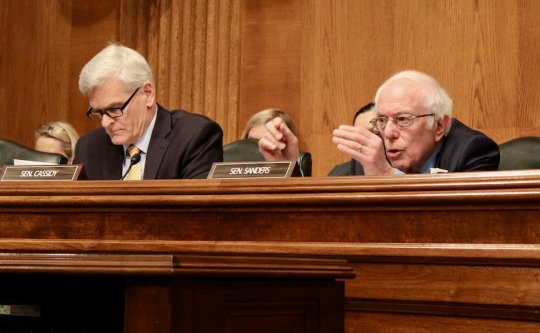 Sen. Bernie Sanders, I-Vermont, gestures during a Thursday hearing on the 32-hour workweek by the Senate Health, Education, Labor and Pensions Committee. Sanders chairs the panel and Sen. Bill Cassidy of Louisiana (left) is the ranking Republican. (Photo: Torrence Banks)
Sen. Bernie Sanders, I-Vermont, gestures during a Thursday hearing on the 32-hour workweek by the Senate Health, Education, Labor and Pensions Committee. Sanders chairs the panel and Sen. Bill Cassidy of Louisiana (left) is the ranking Republican. (Photo: Torrence Banks)WASHINGTON (March 14, 2024)—In 1955, Walter Reuther, head of what was then known as the United Automobile Workers (UAW), told a Senate hearing that coming technological advancements would make a four-day workweek possible.
That was the last Senate hearing on the subject for nearly 70 years. The Senate Health, Education, Labor and Pensions Committee finally ended the draught Thursday as lawmakers debated legislation, sponsored by Sen. Bernie Sanders, I-Vermont, that would reduce the standard workweek to 32 hours without cutting employees' pay.
"…Despite an explosion in technology and a massive increase in worker productivity, nothing has changed," Sanders said. "Think about that, huge transitions we have seen in the economy. But in terms of the workweek, nothing has changed."
Sanders said that the goal of his bill was to ensure that working-class citizens benefit from the revolutionary changes in the workplace over the past seven decades.
Introducing his measure Wednesday, Sanders said that U.S. workers had become over 400% more productive since the 1940s. Even so, people now are working longer hours at lower wages, he said.
UAW President Shawn Fain said that automation now allows a single worker to do what used to require 12 workers. Companies' obsession with ensuring productivity every second of the day has come at the cost of workers, he said.
"When people reach the end of their lives they never say I wish I'd make more money," Fain told senators. "What they wish for is they wish they had more time. There was a time when this phenomenon was supposed to lead to workers getting our time back, getting some of their lives back."
Forty percent of Americans work at least 50 hours a week, and 18% of today's workforce works more than 60 hours a week, according to research cited in Sanders' statement.
A 2019 study published by the International Journal of Environmental Research and Public Health found that working more than 60 hours a week led to a decline in workers' mental health compared to those who worked standard hours.
"It causes an increase in cortisol levels, which lead to heart disease, cancers, strokes," Fain said about working extended hours during the week. "But given all those facts as someone is lucky enough to get to retire, typically when they weren't willing to work themselves to death their entire life, they face knee replacements, hip replacements, shoulder surgeries, and the rest of their lives, figuring out how they're going to survive."
But Liberty Vittert, a data science professor at the Olin Business School at Washington University in St. Louis, said that studies suggesting that working fewer hours leads to happiness are flawed. Vittert said that many of the studies showing an increase in happiness find the effects are short-term and that long-term studies show that happiness does not increase over time.
In addition, only companies that can cut out extra meetings and coffee breaks during the day participate in these studies, excluding more than 70% of the U.S. job economy, Vittert said.
"If you want to see those same employees really stressed out, just see what happens when their employers lay them off to hire part-time workers instead, or have to close their doors because they cannot make enough revenue," Vittert said.
She also pointed out that older workers who cannot complete the same amount of work in fewer hours are also at a disadvantage.
Sen. Bill Cassidy of Louisiana, the ranking Republican on the panel, emphasized that there is no law preventing companies from already enacting a 32-hour workweek and that federal intervention is not necessary.
"Let's give flexibility to workers and employers—don't have government come in and intervene," said Roger King, senior labor and employment counsel at the HR Policy Association.


